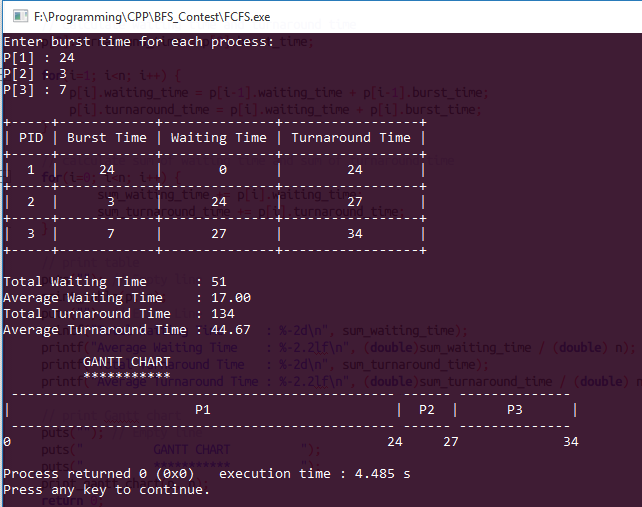Here is a C implementation of the FCFS algorithm. Arrival time of each process is assumed 0 in this program.
#include <stdio.h>
#include <stdlib.h>
#define MAX 100
typedef struct
{
int pid;
int burst_time;
int waiting_time;
int turnaround_time;
} Process;
void print_table(Process p[], int n);
void print_gantt_chart(Process p[], int n);
int main()
{
Process p[MAX];
int i, j, n;
int sum_waiting_time = 0, sum_turnaround_time;
printf("Enter total number of process: ");
scanf("%d", &n);
printf("Enter burst time for each process:\n");
for(i=0; i<n; i++) {
p[i].pid = i+1;
printf("P[%d] : ", i+1);
scanf("%d", &p[i].burst_time);
p[i].waiting_time = p[i].turnaround_time = 0;
}
// calculate waiting time and turnaround time
p[0].turnaround_time = p[0].burst_time;
for(i=1; i<n; i++) {
p[i].waiting_time = p[i-1].waiting_time + p[i-1].burst_time;
p[i].turnaround_time = p[i].waiting_time + p[i].burst_time;
}
// calculate sum of waiting time and sum of turnaround time
for(i=0; i<n; i++) {
sum_waiting_time += p[i].waiting_time;
sum_turnaround_time += p[i].turnaround_time;
}
// print table
puts(""); // Empty line
print_table(p, n);
puts(""); // Empty Line
printf("Total Waiting Time : %-2d\n", sum_waiting_time);
printf("Average Waiting Time : %-2.2lf\n", (double)sum_waiting_time / (double) n);
printf("Total Turnaround Time : %-2d\n", sum_turnaround_time);
printf("Average Turnaround Time : %-2.2lf\n", (double)sum_turnaround_time / (double) n);
// print Gantt chart
puts(""); // Empty line
puts(" GANTT CHART ");
puts(" *********** ");
print_gantt_chart(p, n);
return 0;
}
void print_table(Process p[], int n)
{
int i;
puts("+-----+------------+--------------+-----------------+");
puts("| PID | Burst Time | Waiting Time | Turnaround Time |");
puts("+-----+------------+--------------+-----------------+");
for(i=0; i<n; i++) {
printf("| %2d | %2d | %2d | %2d |\n"
, p[i].pid, p[i].burst_time, p[i].waiting_time, p[i].turnaround_time );
puts("+-----+------------+--------------+-----------------+");
}
}
void print_gantt_chart(Process p[], int n)
{
int i, j;
// print top bar
printf(" ");
for(i=0; i<n; i++) {
for(j=0; j<p[i].burst_time; j++) printf("--");
printf(" ");
}
printf("\n|");
// printing process id in the middle
for(i=0; i<n; i++) {
for(j=0; j<p[i].burst_time - 1; j++) printf(" ");
printf("P%d", p[i].pid);
for(j=0; j<p[i].burst_time - 1; j++) printf(" ");
printf("|");
}
printf("\n ");
// printing bottom bar
for(i=0; i<n; i++) {
for(j=0; j<p[i].burst_time; j++) printf("--");
printf(" ");
}
printf("\n");
// printing the time line
printf("0");
for(i=0; i<n; i++) {
for(j=0; j<p[i].burst_time; j++) printf(" ");
if(p[i].turnaround_time > 9) printf("\b"); // backspace : remove 1 space
printf("%d", p[i].turnaround_time);
}
printf("\n");
}
Output of the above program:
অসাধারন (h) (h) (h) (h) (h) (h) (h) (h) (h)
ReplyDeletehow about in parallel fifo?
ReplyDelete